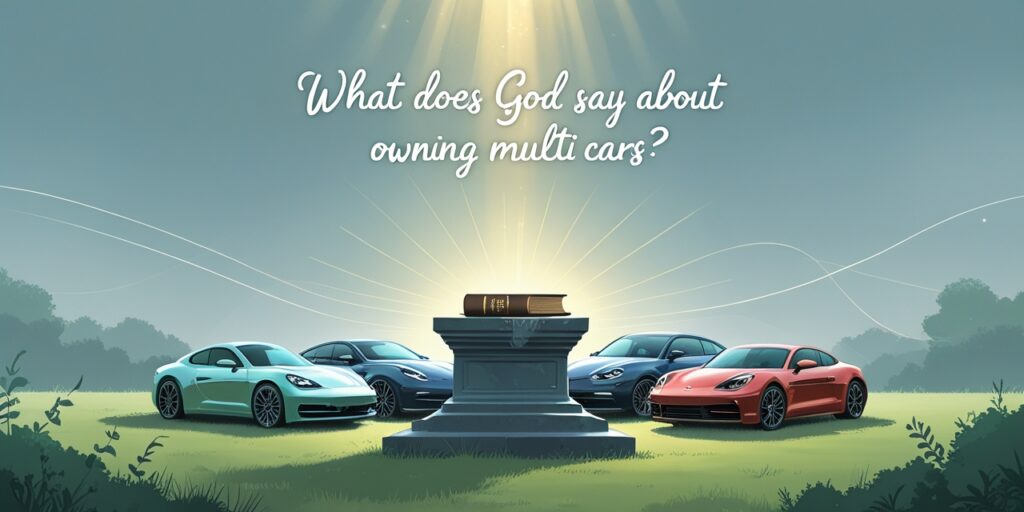Explore the spiritual, ethical, and environmental perspectives of owning multi cars. Discover car ownership ethics with insights on wealth, stewardship, and community.
What Does God Say About Owning Multi Cars?
For many, cars are more than just a way to get from point A to point B they’re an expression of individuality, a passion, and even a mark of accomplishment. From roaring engines to sleek designs, the ownership of luxury or multiple vehicles holds immense appeal. But in the midst of the allure, it’s worth pausing to ask ourselves a deeper question. What does God, or spirituality in general, have to say about owning multiple cars? Does this passion align with the values of faith and stewardship, or does it veer into indulgence?
This blog will guide you through scripture, spiritual teachings, personal reflections, and environmental considerations—all designed to help you better understand what owning multiple cars might represent in the grander scheme of life and faith.
What Does Scripture Say About Material Possessions?
Throughout religious texts, material wealth and possessions are frequently discussed—not as inherently good or bad, but as tools whose significance depends on how they’re used. One of the most referenced passages in the Bible regarding wealth is Matthew 6:19-21 (NIV):
“Do not store up for yourselves treasures on earth, where moths and vermin destroy, and where thieves break in and steal. But store up for yourselves treasures in heaven… For where your treasure is, there your heart will be also.”
This passage highlights the idea that an attachment to material possessions can distract us from spiritual growth. But context is crucial here. Nowhere does it say wealth or possessions, like luxury cars, are inherently wrong. Instead, scripture encourages moderation, gratitude, and using one’s resources to uplift others.
Similarly, Proverbs 22:1 reminds us of the importance of values over vanity:
“A good name is more desirable than great riches; to be esteemed is better than silver or gold.”
If owning multiple cars is about showcasing status rather than fulfilling a deeper purpose, it might be worth reexamining intentions.
The Environmental Perspective on Stewardship
Owning multiple vehicles isn’t just a financial or spiritual question—it’s also an environmental one. Cars, particularly non-electric ones, contribute significantly to greenhouse gas emissions and resource depletion, which raises concerns for those who view Earth as a gift meant to be cared for rather than exploited.
Genesis 2:15 states that humankind was placed in the Garden of Eden “to work it and take care of it.” This can be interpreted as an invitation to practice environmental stewardship. Applying this teaching to car ownership invites us to consider how our choices align with the responsibility of caring for creation.
Questions to ask yourself:
- Are my vehicles necessary, or are they creating unnecessary environmental harm?
- Can I invest in greener options, such as electric or hybrid cars, as a way to reduce my footprint?
- How else can I contribute to sustainable practices within my daily life as a car enthusiast?
The balance lies in being mindful of the ecological impact while appreciating the joy and comfort that cars bring into your life.
The Spiritual Value of Community and Sharing?
Another lens through which spirituality addresses material possessions is generosity and sharing. The idea of community is central to many faith traditions, emphasizing that blessings are not meant to be hoarded but to be shared.
Acts 2:44-45 provides a compelling example of this generosity in action:
“All the believers were together and had everything in common. They sold property and possessions to give to anyone who had need.”
Owning multiple cars—whether luxury sports cars, classic collectibles, or practical sedans—could be seen as an opportunity to contribute. For example:
- Lending a vehicle from your fleet to someone in need.
- Using a luxury car as part of a charitable event, like a fundraiser or community initiative.
- Offering carpooling options within your community to reduce collective carbon footprints.
The essence of this teaching encourages us to view excess as a chance to uplift others.
Personal Stories from Car Enthusiasts and Spiritual Seekers
For some owners, reconciling the love of cars with spiritual and ethical concerns becomes an enlightening personal journey. Take Rachel, for example, a luxury car enthusiast from Los Angeles:
“I’ve always loved cars—the beauty, the engineering, the thrill. But at one point, I had five parked in my driveway and felt a weight I hadn’t noticed before. It wasn’t guilt but realization. I now use my passion for cars to mentor young girls in STEM who dream of working in automotive design. It’s my way of using what I love for something bigger than myself.”
Or consider Josh, a classic car collector from New York:
“Collecting vintage cars is a family tradition for me, but I started hosting community car shows with proceeds going to local schools. I’ve found that giving my passion a purpose has made it even more fulfilling.”
These stories reflect the possibility of aligning one’s love of cars with acts of responsibility, generosity, and humility.
Driving Passion with Perspective
Ultimately, owning multiple cars is neither inherently virtuous nor immoral. What truly matters is the intention behind the ownership and how it aligns with one’s values whether those values stem from faith, environmental stewardship, or a sense of community. Take time to reflect:
- Are my possessions serving a purpose beyond personal indulgence?
- Can I adjust my decisions to honor both my passions and ethical responsibilities?
If what moves you are the hum of a well-tuned luxury car or the thrill of a collection that tells a story, savor it. Just ensure it doesn’t come at the expense of core spiritual teachings like humility, stewardship, and generosity.
What does God say about owning multiple cars? Perhaps it’s less about the cars themselves and more about the driver’s heart.

